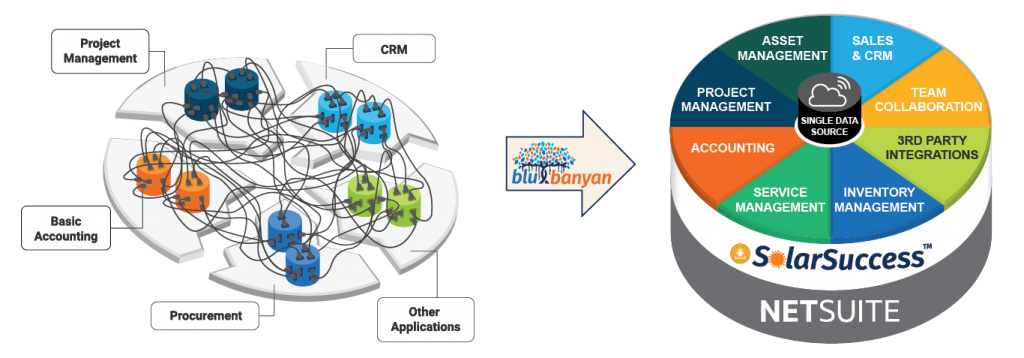Why Every Solar Business Needs a Solar ERP Solution
What is Solar ERP?
ERP is an acronym for Enterprise Resource Planning. ERP software provides all of the functionality required to run a business. It can be divided into several separate modules or key areas of functionality that provide the structure for departments within an organization to effectively work together and collaborate resources. Solar ERP software is ERP software that is optimized to meet the specific needs of the solar industry. Solar ERP software can be designed for specific segments of the solar industry from residential rooftop installers, to commercial and utility scale installers and developers.
Need for ERP in the Expanding Solar Industry
ERP for solar is the solution for solar companies looking to grow and scale profitability. Many solar installers continue to use a mix of incompatible entry-level software, disparate technology systems, and specialty programs to run their businesses, even as they scale up to meet the growing demand for solar installations. Because QuickBooks doesn’t “talk” to Salesforce.com—and because Salesforce.com isn’t integrated with job-costing tools—an installer’s procurement, accounting and sales teams are literally working from different playbooks. Processes can easily digress into a patchwork of spreadsheets containing outdated information that are used to manually shuttle data between incompatible applications. This siloed approach requires lots of labor and simply doesn’t cut it in today’s collaborative world. Both internal and external partners need common technology platforms, such as cloud-based solar ERP software.
What Are Specific Features of a Solar ERP?
While all ERP software systems have variations in functionality and usability, most solar ERP software provides companies the tools necessary to run company operations.
Solar ERP software such as Blu Banyan’s SolarSuccess, connects all departmental data together seamlessly, in a single source of truth. Having a single data source across company operations is important to maintain real-time insight into Key Performance Indicators (KPIs) including company and project profitability, project status, commission reports, and the sales pipeline.
What is Cloud-based ERP?
Companies such as Oracle NetSuite have built an ERP platform in the cloud, meaning the software and company data is stored on servers and it is accessible from any computer through a user login portal. Storing data in the cloud gives users with permission provisioned access to the tools and data necessary to complete the functions of their roles.

The NetSuite ERP platform unifies accounting, project management, CRM/sales and inventory management providing a single source of unified truth. SolarSuccess is built on the Oracle NetSuite ERP platform and it uniquely adds an additional layer of solar industry specific functionality creating a comprehensive solar ERP solution.
Do Other Industries Use Solar ERP?
Solar ERP software is mainly used by residential, commercial, and utility solar installers, solar developers, and solar asset managers, but it is not exclusively used by the solar industry. Because of its robust project management capabilities, solar ERP is also a great choice for both the energy industry and construction industry.
SolarSuccess is the end-to-end solar ERP energy industry solution. Renewable industries that benefit from SolarSuccess include solar power, wind power, hydro-electric power, and other forms of green energy. SolarSuccess is also used by roofing companies. Rooftop contractors and construction companies can utilize the modules of ERP software for the energy industry such as project management, inventory management, accounting, sales and CRM to organize project data, create workflow automations, and gain visibility into all company operations.
Other industries in need of an ERP solution include retail, manufacturing, wholesale distribution. Blu Banyan can customize ERP solutions for any type of business. See all services offered.
How to choose a Solar ERP?
There are many factors to consider when selecting a Solar ERP solution for your company. Making the switch from legacy software to an ERP platform is a big decision that should be carefully thought out. Consider the pros and cons of each option, get detailed information, attend demos, read white papers, case studies, and testimonials to educate yourself on the options available. Bodhi/17TerraWatts published a Guide to Building an Effective Solar Software Stack that contains tips from solar industry leaders on how to tackle selecting software for your solar business.
What are the Components of SolarSuccess Solar ERP?
SolarSuccess is greater than the sum of its parts because it connects all departments and data in real-time. It includes solar asset management software, solar project management software, solar sales & CRM software, solar inventory management software, solar service management software, solar accounting software, and optional 3rd party integration software.
SolarSuccess Features:
Real-time insight into project status, costs and profitability
Real-time inventory availability, pricing and purchasing from distributors
Visual timelines and project milestones that trigger accounting events
Rich team chat to optimize internal company communications
Synchronization of project bills of materials (BOM) on sales orders
Project-specific document management with revisions
Solar-specific financial templates
Solar-specific key performance indicators (KPIs), dashboards and alerts
With SolarSuccess, all aspects of an installer’s business—sales pipeline management, CRM, accounting, purchasing, installation project management (including project costing and profitability), inventory and warehouse management, customer invoicing, universal financier connectivity, and business intelligence—share data from a single source. The solution provides real-time end-to-end visibility of the key functions necessary to a solar installer’s success.
Learn more about SolarSuccess solar ERP on our solar solutions page. Check out this interactive infographic: How Titan Solar Power Managed Growth Effectively


